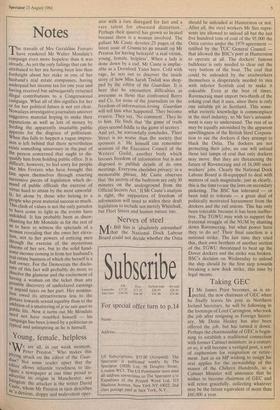Nerves of steel
Mr Bill Sirs is 'absolutely astonished' that the National Dock Labour Board could not decide whether the Ostia should be unloaded at Hunterston or not. . After all, the steel workers Mr Sirs repre- sents are allowed to unload all but the last five hundred tons of coal of the 95,000 the Ostia carries under the 1979 agreement — ratified by the TUC General Council that allowed the BSC's port at Hunterston to operate at all. The dockers' famous bulldozer is only needed to clear out the very bottom of the boat. The coal that could be unloaded by the steelworkers themselves is desperately needed to mix with inferior Scottish coal to make it cokeable. Even at the best of times, Ravenscraig must import two-thirds of the coking coal that it uses, since there is only one suitable pit in Scotland. This some- what esoteric knowledge is commonplace in the steel industry, so Mr Sirs's astonish- ment is easy to understand. The rest of us may be equally astonished by the apparent unwillingness of the British Steel Corpora- tion to sue the dockers if they attempt to black the Ostia. The dockers are not protecting their jobs; no one will unload those last lumps of coal that only dockers may move. But they are threatening the future of Ravenscraig and of 16,000 steel- workers' jobs. Clearly the National Dock Labour Board is ill-equipped to deal with matters of such magnitude; just as clearly, this is the time t o use the laws on secondary picketing. The BSC has tolerated — or been told to tolerate — a great deal of politically motivated harassment from the dockers and the rail unions. This has only been tolerable because it has been ineffec- tive. The TGWU may wish to support the fraternal struggle of the NUM by shutting down Ravenscraig, but what power have they to do so? Their final sanction is a national strike. The last time they tried this, their own brothers of another section of the TGWU threatened to beat up the Dover dockers and the strike was broken. BSC's decision on Wednesday to unload the ship should be the first step towards breaking a new dock strike, this time by legal means.






































 Previous page
Previous page